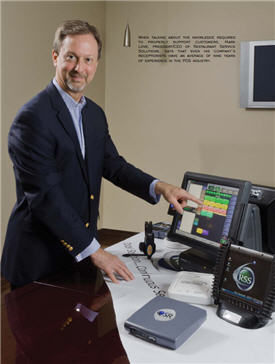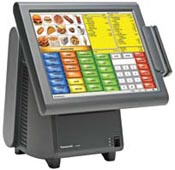Expand Your POS Solutions Set
By Matt Pillar, Business Solutions magazine
After changing to a total-solutions business model, this POS VAR is expecting 23% revenue growth.

When Mark Love found himself at the helm of operations for Restaurant Service Solutions (RSS) in 2006, the three-man company had but one thing to offer: tech maintenance services for local restaurants running Panasonic hospitality systems. Since its origin in 2003, RSS had sold no hardware or software, but it had established a significant portfolio of restaurants that relied on its help desk, on-site services, and depot maintenance plans, primarily for Panasonic. Six years after Love came on board, the growing company employs 20 professionals in two offices and sells just about every technology system found within the four walls of a restaurant.
Love, a 33-year veteran on the hospitality technology scene, ran his own company for 18 years and honed his skills at Bristol, ERC, Delphi, and Dumac before joining RSS as a partner in 2006. His mission was to grow the business, and in 2011 that mission became his own, when the founding partner decided to leave the company. “Our small, service-based company was profitable, but in order to grow we had to expand our solutions set. We decided to build a full-solution offering and back it up with the reputation we had gained for our support and maintenance services,” says Love. That required hand-picking top-shelf hospitality products and backing them up by recruiting experienced sales and support staff.
Build Out Of A Solutions Portfolio
The hospitality technology landscape has become crowded at a dizzying pace as new technology vendors crop up, peddling everything from core restaurant systems to peripheral components and new mobile and consumer-facing applications. Despite the rapid growth of the RSS solutions set and the new applications that are constantly pitched at him, Love says it’s not so much about the products he chooses to sell, but finding quality solutions to meet the customers’ needs. Pragmatically, he lets customer needs dictate RSS’ course of action.
That said, RSS moved quickly toward building a holistic portfolio. The company now offers sales and support of POS hardware and software, digital menu boards, drive-thru communication/camera/speed of service systems, telephone service, Internet access and online ordering, a proprietary back office reporting application, in-store TV and digital signage, surveillance systems, and soon, in-store music. “In short, our solutions set comprises everything between the telephone pole that goes into the restaurant and the back office systems reporting up to headquarters,” says Love. “But when we decided we were going to become a total solutions provider, we didn’t just take on any product that was out there.”
Adding XPIENT, for instance, constituted a calculated decision. “XPIENT is a highly featured product, to the point that even XPIENT acknowledges that it is a complex product to sell through the reseller channel because of the level of attention required to execute software installation, training, and follow-through,” explains Love. After RSS had bolted down its core hospitality hardware (Panasonic) and software (XPIENT & Microsale) offerings, the market dictated the other solutions it currently sells. If a critical mass of customers were in need, systems such as digital signage and drive-thru solutions were added to the line card. Each came with a corresponding acquisition of relevant talent. “We’ve arrived at a position where we’re experts at configuring and customizing any of our systems for our customers, and we’re confident in our ability because we’ve brought on the people we need to excel in software and integration,” says Love.
Ongoing Employee Investments
That Love is quick to laud his employees’ skill sets is not empty marketing-speak. The XPIENT example is illustrative of the talent acquisition spree RSS went on concurrent with its technology build-out. This ongoing talent investment began in 2008, including positioning a Microsoft-certified systems engineer as the director of technology development and a number of Microsoft-certified engineers on the professional services team. Since November 2011 alone, the company has brought five new staffers on board at its headquarters and branch office in Mississippi, a trend Love says will continue this year with plans to grow the RSS workforce by 20%. That employee growth is cross-departmental, with additions spread across sales, 24-hour help desk, depot exchange, and installation teams. Underscoring the company’s deep expertise is the fact that every employee, including the president himself, undergoes vendor-sponsored training on the solutions RSS sells. Love says very little, if any, training is second-hand. “From the very first person who answers the phone, and by the way, we still answer the phone, you’re dealing with someone who understands the technology and the needs of the industry. Even our receptionists have an average of nine years experience in the POS industry,” says Love.
He’s also careful to point out that there’s more to building a successful team than tech training and skill level. Love is an advocate of Jim Collins’ Good To Great philosophy, particularly that employee performance is facilitated through example and empowerment. “That starts with me and carries through to our department heads. If we’re well-trained and allowed to work creatively in our daily tasks, we’ll give everything we have to whatever we put our hands to.”
Achieving Fast But Measured Growth
Fast growth of young companies is often associated with high levels of borrowed money and risk. That wasn’t the case for RSS. Love says the company’s growth has been fueled purely by its own momentum. RSS pays its employees above scale, has perfected the art of positive cash flow, and has never borrowed money. “We’re not the price leader in our market, but if we’ve done our job of illustrating the return we bring to the table, we will win the business,” says Love. The company’s unbendable terms are a significant aspect of its success. Any business it wins is funded up front, ensuring RSS gets paid for its work at a rate Love insists is worthy of the company’s effort.
As for the illustration of ROI, RSS hangs its hat on three key areas. First, it demonstrates the payback on integrated credit card processing and POS hardware, as opposed to the legacy segregated approach so many restaurateurs still grapple with. In most cases, this integration proves to save RSS customers thousands of dollars per month. Next, RSS pushes biometric readers for timekeeping, which mitigates sloppy payroll costs and employee time theft. Finally, conversion from legacy back office systems to RSS’ ARMOR, a back office product it developed and customizes for each client, drops the typical customer’s food cost by a minimum of 1%. Love says that in most cases that conversion alone equates to tens of thousands of dollars in annual savings.
RSS also profits by carrying its internal stickler-for-training mentality through to its customers. Love believes that solutions providers carry the brunt of the blame for hospitality establishments that only scratch the surface of their software’s functionality, so a concerted, ongoing customertraining program is packaged into every deal. “If an RSS customer doesn’t fully embrace the software components it buys, it won’t optimize its savings and fully exploit its ROI,” he says. Many VARs scale back their training effort to keep their cost of the sale low, but Love insists on customer training. The RSS end-user training regimen includes a predeployment training “event,” live deploymentday support, and postdeployment training checks at two weeks, 30 days, and beyond. “Of course, not everyone converts to a ‘Class A’ user, but we help customers get past old habits, mentalities, and shortcuts to the best of our ability,” says Love.
Just six years ago, RSS relied on its service expertise for 100% of its revenue. Today, hardware sales account for 57% of its income, a figure Love says is still growing as a result of its hardware portfolio expansion. With that new source of sales and a continued focus on service revenue, the company anticipates another year of double- digit growth in 2012. “When your successes resonate in your community, opportunities come to you,” says Love. And those opportunities keep coming for RSS, which finds stability in its success. “We’re now in an advantageous position, as a total-solutions provider which presents an entry point with almost any account we choose to target.”

